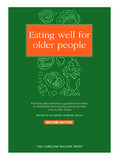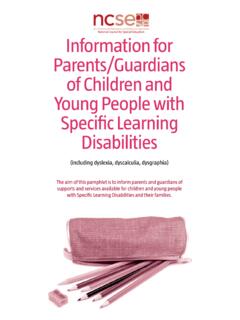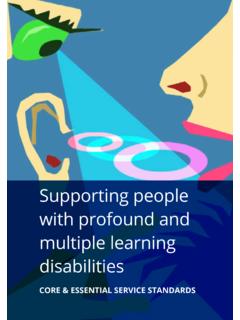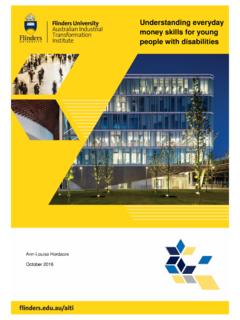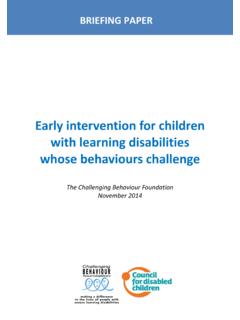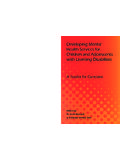Transcription of children with learning - The Caroline Walker Trust
1 eating well : children and adults with learningdisabilitiesNutritional and practical guidelines THE Caroline Walker TRUSTFor further copies of this report contact theCaroline Walker Trust at 978-1-89-782023-0 THE Caroline Walker TRUSTE ating well : children and adults with learning disabilities THE Caroline Walker TRUST29552_CVr:29552_CVr 31/10/07 15:35 Page 1 The Caroline Walker Trust , 2007 ISBN 978-1-89-782023-0 The Caroline Walker Trust22 Kindersley WayAbbots LangleyHerts WD5 : charity number: 328580 Further copies of this report are available from the address above,via the website or from 20 including postage and packing. Please make cheque payable to The Caroline Walker Trust .
2 This report is provided for information only and individualadvice on diet and health should always be sought fromappropriate health text and tables contained in this report can be photocopiedand reproduced by all those who support children , young peopleand adults with learning disabilities to eat well , providing anacknowledgement is made to The Caroline Walker Trust . Design by Information Design publications by The CarolineWalker Trust For details see Reports eating well for Under-5s in Child CareEating well at SchoolEating well for Looked After children and Young PeopleEating well for Older PeopleEating well for Older People with Dementia (Published by VOICES. Now out of print but available to downloadfrom the CWT website )29552_CVr:29552_CVr 31/10/07 15:35 Page 2 eating well : children and adults withlearning disabilitiesNutritional and practical guidelinesBy Dr Helen CrawleyTHE Caroline Walker TRUST29552_Text:29552_Text 1/11/07 16.
3 06 Page 12 AcknowledgementsThe Caroline Walker Trust would like to thank all the members ofthe Expert Working Group, listed below, for their help in theproduction of this Caroline Walker Trust would also like to thankthe following people and organisations for theirhelp and support in the production of this Darren Chadwick, Department of Psychologyand Speech Pathology, Manchester MetropolitanUniversityCHANGE, National rights organisation led bydisabled people, LeedsJosephine Clarke, Social Worker with experience inresidential careJanet Cobb, Coordinator, learning DisabilitiesHealth NetworkTrak Davis, Senior Paediatric Dietitian,Hammersmith Hospital Carole Dormer, Hotel and Catering ServicesManager, Sanctuary CareDr Shaun Gravestock, Consultant Psychiatrist Diana Hawdon, Registered Public HealthNutritionistKatrine Hurst, Senior Dietitian for children withSpecial Needs, North East Essex Primary Care TrustGill Joslin, Home Manager, Douglas JackmanHouseAlison Levens, Youth Project WorkerMarjory Macleod, Senior Dietitian, LearningDisabilities Team, EdinburghDr Craig Melville, Senior Lecturer in LearningDisabilities Psychiatry, University of GlasgowNutmeg UK( ) for providingmenu planning softwareJosie Scantlebury.
4 Josie has learning disabilitiesand works at Mencap in the campaign teamDr Eamonn Slevin, Reader in Nursing, University ofUlsterLesley Starkfor developing and analysing theexample eating plans in chapter 11 Pauline Stylesfor CWT administrative supportJenny Taylor, Manager, The Ridgeway Day CentreMandy Tilston-Viney, Association for Real Change(ARC) AngleseyNicky Walker , Specialist Dietitian, Dietetic Servicefor adults with learning disabilities , BirminghamNorma Wilson, Foster Carer with a foster childwith Down s syndromeExpert Working GroupAnne Dillon, Barrister, and founder member of theCaroline Walker Trust (Chair)Dr Helen Crawley, Public Health Nutritionist andScience Director, The Caroline Walker TrustAlison Giraud-Saunders, Co-Director, Foundationfor People with learning DisabilitiesKirsty Hamilton, Chair of Scottish LearningDisability Dietetic Clinical NetworkSue Hawkins, Chairman of the National Associationof Care Catering, and Catering Services Manager,Dorset County CouncilSarah McIntyre, Regulation Manager, Commissionfor Social Care Inspection (CSCI)
5 Steve Pitt, Director of Adult and CommunityServices, Dorset County CouncilDr Claud Regnard, Consultant in Palliative CareMedicine, Newcastle upon TyneSu Ring, Occupational Therapist, Community Teamfor People with a learning Disability, Weston-super-MareTheresa Shepherd, Health Promotion Officer,MencapFrances Watson, former Speech and LanguageTherapist and Clinical Speciality Advisor at theNational Patient Safety AgencyProfessor Richard Watt, Department ofEpidemiology and Community Health, and Trusteeof The Caroline Walker TrustObserversSarah Burchell, Valuing People TeamOrla Hugueniot, Senior Scientific Officer (NutritionBranch), Food Standards AgencyDr Sheela Reddy, Principal Nutrition Scientist,Department of HealthEditorRosie Leyden, Wordworks29552_Text:29552_Text 1/11/07 16:06 Page 23 ForewordThe Caroline Walker Trust (CWT) is dedicated to theimprovement of public health by means of good food.
6 Itwas established in 1988 to continue the work of thecampaigning nutritionist Caroline Walker , who passionatelybelieved that everyone deserved access to good-qualityfood. The CWT has produced a series of publications whichprovide practical guidance on eating well for those whocare for vulnerable people in our society. The CWT s firstexpert report Nutritional Guidelines for School Meals,published in 1992 set the standard for the provision ofnutrient-based standards which the Trust continued in itsEating Wellreports for: older people; under-5s in child care;looked after children and young people; and children aim of all the CWT reports is to provide a summary ofcurrent knowledge about the eating and drinking issues forspecific population groups and to provide nutrient-basedstandards, practical guidelines and recommendations whichpeople can use as the basis for developing policy bothnationally and locally.
7 In the last 20 years there has beenmuch greater public and political awareness of the need forgood food and good nutrition. However, shocking reportsof negligence in ensuring that some of the most vulnerablepeople in the UK are enabled to eat well still make thenews each year. From the evidence compiled in this reportit would appear that there is still much work to be done toensure good nutritional health for people with learningdisabilities and their families and to raise awareness of theneed for good nutritional health to be given higher priorityin national and local initiatives. We hope that this reportwill stimulate discussion, training and policy developmentamong all those who support children , young people oradults with learning disabilities throughout the UK, and thatothers will now take up the challenge to put the nutritionaland practical guidelines in this report into is extremely grateful to Anne Dillon and the membersof the Expert Working Group who steered this reportskilfully and provided advice and useful discussionsthroughout.
8 We would also like to thank all those whokindly offered help, support and guidance throughout theproduction of the report and particular thanks, as always,go to Rosie Leyden who edited and managed this projectwith great Helen CrawleyJoe HarveyScience DirectorChairCaroline Walker TrustCaroline Walker Trust29552_Text:29552_Text 1/11/07 16:06 Page 34 ContentsChapter 1 Summary and recommendations7 Summary7 What is the scope of this report?8 The aims of this report 9 Who the report is for9 Recommendations10 Practical guidelines12 Chapter 2 About learning disabilities19 What is learning disability?19 Who has learning disabilities in the UK?20 Care and support for people with learning disabilities21 Employment and benefits22 How does having a learning disability impact on everyday life?
9 22 Causes of learning disabilities and their impact on health23 Other health difficulties associated with learning disabilities25 The impact of learning disabilities on eating and drinking27 The effects of drugs on nutritional status30 Can diet be used to prevent or treat learning disabilities ?31 Can diet be used to treat specific conditions found among people with learning disabilities ? 32 Chapter 3 Principles of good nutrition35 Energy (calories)36 Fat37 Carbohydrates38 Fibre40 Protein40 Vitamins and minerals41 Water46 The Balance of Good Health46 Preventing diseases: heart disease, bone disorders, cancer and infections47 Chapter 4 Nutrition through the lifespan for children , young people and adults with learning disabilities51 Infants52 Children52 Teenagers54 Pregnancy54 Parenthood55 The menopause55 Old age55 End of life5629552_Text:29552_Text 1/11/07 16.
10 06 Page 45 Chapter 5 Weight management59 Identifying underweight and overweight59 Underweight61 Nutrition support62 Overweight and obesity63 Managing overweight65 Physical activity66 Chapter 6 Gastrointestinal disorders, swallowing difficulties and oral health71 Gastrointestinal disorders71 Constipation72 Diarrhoea73 Coeliac disease74 Swallowing difficulties74 Oral health75 Chapter 7 How to eat well throughout the day81 Food for all81 The eating environment82 eating patterns, and timing of meals and snacks83 Breakfast83 Snacks83 Drinks84 Fruit and vegetables86 Salt87 Sugar88 Meat and fish88 Vegetarian diets88 Vitamin, mineral and herbal supplements89 School lunches89 Packed lunches90 eating out and take-aways90 Food allergy and food intolerance91 Food hygiene and safety92 Chapter 8 Encouraging eating well97 Philosophy of care: rights and responsibilities97 Helping people make good choices98 Organisational culture100 Staff training and support100 Involving and listening to family and friends100 Food as a treat or reward101 Engaging with health and other professionals 101 Health action plans and annual health checks102 Food knowledge and skills of people with learning disabilities10329552_Text:29552_Text 1/11/07 16.

